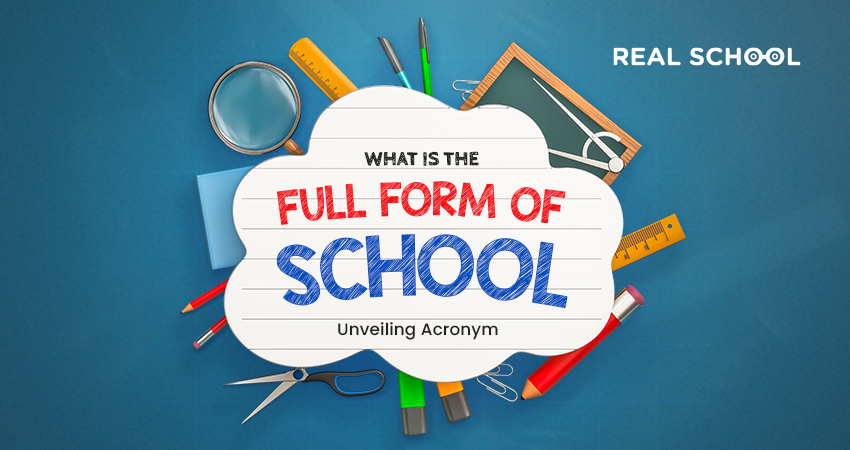The term “school” carries profound significance in the realm of education, representing more than just a physical institution. Unveiling the acronym behind “school” unravels layers of historical context, evolving roles, and the profound impact these institutions have on individuals. This exploration – “What is the Full Form of School?” goes beyond the letters to understand the sanctuary of learning, the center for character development, and the hub of diverse experiences that schools embody.
What is Full Form of ‘School’!! – 06 Golden Signs
‘School’ word is combination of 08 unique signs which are called:
- S: Sanctuary of Learning
- C: Center for Character Development
- H: Hub of Diverse Experiences
- O: Origin and Evolution of Schooling
- O: Ongoing Commitment to Excellence
- L: Lifelong Impact on Individuals
Unveil ‘S-C-H-O-O-L’: What is Full Form of ‘School’!!
S: Sanctuary of Learning
- The concept of school as a sanctuary of learning: At its core, a school is a sanctuary of learning—a space where knowledge is not only imparted but also cultivated. It serves as a haven for intellectual growth, providing an environment where students can explore, question, and expand their horizons.
- Creating a conducive environment for intellectual growth: Schools play a pivotal role in creating an environment conducive to intellectual growth. From well-equipped classrooms to libraries and laboratories, these spaces are designed to foster curiosity and facilitate the pursuit of knowledge.
- The role of schools in nurturing a love for learning: Beyond academic instruction, schools aim to nurture a love for learning. Engaging teaching methods, interactive lessons, and a supportive atmosphere contribute to instilling a lifelong passion for acquiring knowledge.
C: Center for Character Development
- Beyond academics: schools as centers for character development: Schools go beyond academics, serving as centers for character development. The values, ethics, and social skills instilled during formative years play a crucial role in shaping individuals into responsible, empathetic, and ethical members of society.
- Fostering values, ethics, and social skills: Character development in schools involves fostering values such as integrity, respect, and empathy. Through interactions with peers and educators, students learn the importance of ethical conduct and develop social skills essential for collaboration and communication.
- The lifelong impact of character development in schools: The impact of character development in schools extends beyond the classroom. The values instilled during school years become guiding principles throughout life, influencing personal and professional decisions and contributing to the overall well-being of individuals.
H: Hub of Diverse Experiences
- Schools as hubs for diverse experiences: In addition to academic pursuits, schools function as hubs for diverse experiences. Extracurricular activities, sports, arts, and social interactions contribute to shaping well-rounded individuals with a broad spectrum of skills and interests.
- The importance of extracurricular activities and social interactions: Extracurricular activities and social interactions are integral components of the school experience. Participation in sports, clubs, and cultural events not only enhances skills but also fosters teamwork, leadership, and a sense of community.
- Shaping well-rounded individuals through varied experiences: The diverse experiences offered by schools contribute to shaping well-rounded individuals. Exposure to various activities allows students to discover their passions, develop talents, and cultivate a holistic approach to life.
Also Read: How Do You Start Homeschooling For Your Child?
O: Origin and Evolution of Schooling
- Tracing the origin and historical evolution of schooling: The concept of formal schooling has deep historical roots. Tracing its origin from ancient civilizations to the establishment of formal education institutions, the evolution of schooling reflects societal changes and the recognition of education as a cornerstone of progress.
- Milestones in the development of formal education institutions: Significant milestones mark the development of formal education institutions, from the establishment of ancient academies to the emergence of medieval universities. Each era has contributed to shaping the structure and purpose of schools as we know them today.
- Adapting to societal changes: the continuous evolution of schools: Schools continuously adapt to societal changes. From the industrial revolution to the digital age, schools have evolved to meet the needs of changing times, incorporating advancements in technology, curriculum development, and teaching methodologies.
O: Ongoing Commitment to Excellence
- The commitment of schools to academic excellence: Schools uphold a commitment to academic excellence. This dedication involves providing quality education, fostering critical thinking, and preparing students for the challenges of an ever-changing world.
- Continuous improvement and adapting to educational advancements: The pursuit of excellence in schools involves continuous improvement. Schools adapt to educational advancements, incorporating innovative teaching methods, embracing technology, and staying abreast of developments to ensure a relevant and impactful learning experience.
- How schools contribute to shaping a knowledgeable society: Through their commitment to excellence, schools contribute to shaping a knowledgeable society. The education imparted in schools forms the bedrock of informed citizenship, with graduates contributing to advancements in various fields and participating actively in civic life.
L: Lifelong Impact on Individuals
- The enduring impact of school on individuals: The impact of school on individuals lasts a lifetime. School experiences shape not only academic achievements but also the character, values, and worldview of individuals, influencing their choices, relationships, and contributions to society.
- Shaping future leaders, thinkers, and contributors to society: Schools play a vital role in shaping future leaders, thinkers, and contributors to society. The education, skills, and values instilled during school years lay the foundation for individuals to make meaningful contributions in their chosen fields and communities.
- Personal anecdotes and testimonials reflecting the lifelong influence of school experiences: Personal anecdotes and testimonials offer glimpses into the lifelong influence of school experiences. Stories of individuals who attribute their success, resilience, and personal growth to school highlight the enduring impact of these formative years.
Also Read: What is a Montessori Preschool Program?
Conclusion
In conclusion, the full form of “school” involves being a Sanctuary of Learning, a Center for Character Development, a Hub of Diverse Experiences, and an Ongoing Commitment to Excellence. The acronym encapsulates the multifaceted nature of schools, emphasizing their pivotal role in education, character formation, and societal progress.
Hey, if you are looking for your child development then know more from the expert regarding your child education – The Real School
FAQs
Q1: What makes schools a sanctuary of learning?
A: Schools serve as sanctuaries of learning by providing environments conducive to intellectual growth. They offer spaces where students can explore, question, and expand their knowledge, fostering a love for learning.
Q2: How do schools contribute to character development?
A: Beyond academics, schools contribute to character development by fostering values, ethics, and social skills. The values instilled during formative years play a crucial role in shaping individuals into responsible, empathetic, and ethical members of society.
Q3: Why are diverse experiences important in schools?
A: Diverse experiences in schools, including extracurricular activities and social interactions, are important for shaping well-rounded individuals. They enhance skills, foster teamwork, leadership, and a sense of community, contributing to holistic personal development.
Q4: What is the historical evolution of formal schooling?
A: The historical evolution of formal schooling traces back to ancient civilizations and includes significant milestones such as the establishment of ancient academies and medieval universities. Schools have continuously evolved to meet societal changes and educational advancements.
Q5: How do schools contribute to shaping a knowledgeable society?
A: Schools contribute to shaping a knowledgeable society by upholding a commitment to academic excellence. The education imparted in schools forms the foundation of informed citizenship, with graduates actively contributing to advancements in various fields and civic life.
Also Read: What is The Real Full Form of School? Unveiling Mystery







